 The Best Electric Pressure Washers of 2023 – Our Reviews, Ratings & Tips for Buying
The Best Electric Pressure Washers of 2023 – Our Reviews, Ratings & Tips for Buying
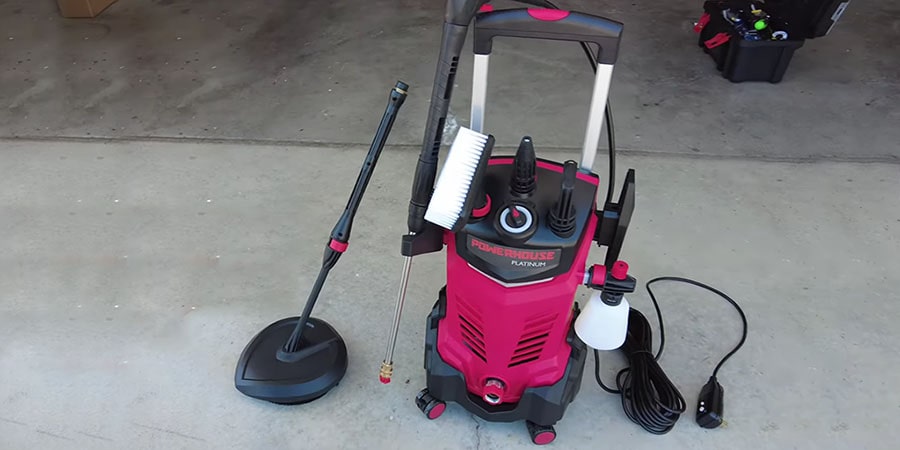
You have three choices when it comes to pressure washing your grimy outdoor surfaces: hire a professional, rent a unit, or buy one. Purchasing your own top-performing electric pressure washer can save you money down the road, especially if you’ll use it more than once or twice a year. Gas pressure washers are another option, but for most homeowners, a top-rated electric power washer will perform just as well as an average gas model.
Our Top Picks
We select, test, review and suggest the best products. We may earn a commission, if you buy something through our links.
Why Electric over Gas*? Here are the PROS:
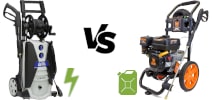
- Quieter
- Cheaper
- Smaller and lighter
- Easier storage
- Can be used indoors (depends on cleaning surface)
* Like all pressure washers, they can be dangerous if not used correctly. We’ll talk about safety tips that will prevent surface damage as well as injury to you, your family, pets and plants.

In general, you want to pay attention to the following characteristics so you’ll know which pressure washer will be right for the cleaning jobs at your home. We will touch on some of these in our reviews:

- Price
- PSI / GPM / CU (cleaning power)
- Warranty
- Weight
- Extra nozzles (on board storage is a big plus)
- Plastic or stainless wand
- Wheels – larger and pneumatic wheels provide the best stability and maneuverability
- Plastic or brass couplings for hose attachment
- Cord and hose length – minimum 20-foot hose and 30-foot cord
- Hose and cord storage
Besides those criteria, we’ll mention noise levels, which surfaces benefit most from each model, and feedback from real customer experiences. Top models include brands such as Sun Joe, Greenworks, AR Blue Clean, Karcher & Ivation.
The Cleanup Expert Review Process
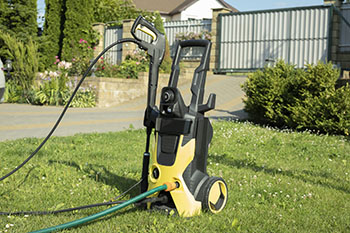
We understand how important it is to get a full picture of a product before purchasing it, which is why we’ve thoroughly tested and reviewed each model on this list for you, so you don’t have to. Model by model, washer by washer, we’ve devoted an untold number of hours ensuring you’re receiving the best information currently available online for these products.
This exhaustive testing, combined with extensive expertise, helps better inform and guide you during the tricky time of researching a significant purchase. The models mentioned on this list have proven themselves to be the very best currently available in the market today, demonstrating their exceptional cleaning power and outstanding overall reliability.
To help cover the wide variety of potential applications people may use these electric pressure washers for, we’ve made sure to include various models with different pressures and features. This broad selection allows you to choose the model that works best for you, whether you’re prioritizing power, price, features, or accessories.
The Best Electric Pressure Washers
In general, we tend to recommend electric pressure washers to most homeowners. This is because they tend to offer more straightforward operation, are more reliable, and are easier to maintain than their gas-powered counterparts. Not that there’s anything wrong with gas-powered models, but electric ones make a better starting point for newer and less experienced users.
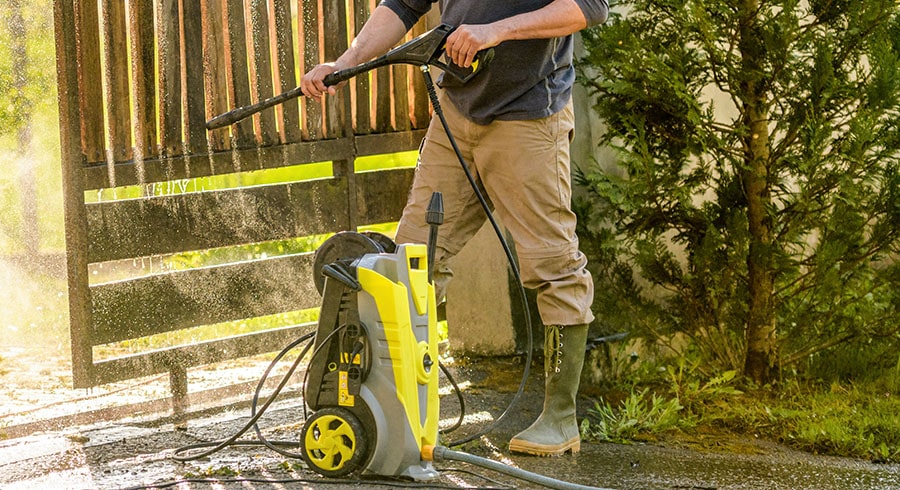
As mentioned, the electric pressures covered on this list have demonstrated themselves to be the best in the industry. So continue reading on as we review the good, the bad, and everything in between about the best pressure washers of 2023 with our detailed Cleanup Expert reviews.
Our 2023 Ratings & Reviews – The Best Electric Power Washers
Ah the joys of owning your own pressure washer. For most homeowners, electric models like the ones we listed here are plenty powerful enough for your average cleaning tasks. If you need something that will tackle really heavy-duty tasks like paint stripping, deep stain removal, etc. you should probably consider a gas pressure washer. We have a few suggestions for those too.
What are the PROS/CONS of Gas vs. Electric

Electric pressure washer PROS:
- Quieter
- Cheaper (average $150 – $250)
- Easy storage
- Can use indoors
- Lighter

Electric pressure washer CONS:
- Cord limits reach
- Less power

Gas pressure washer PROS:
- More power
- Can be used anywhere outdoors, no power outlet needed

Gas pressure washer CONS:
- More expensive (average $300 – $500)
- Heavier
- Louder
- Cannot be used indoors
Play it safe with pressure washers
Safety is a big concern with any pressure washer. Some people don’t understand that pressure washers can be dangerous. The very high pressure produced from the water stream can seriously injure people and some surfaces like car paint or glass. We’re talking skin lacerations, even amputations, plus kickback forces that can easily knock a person off a ladder.
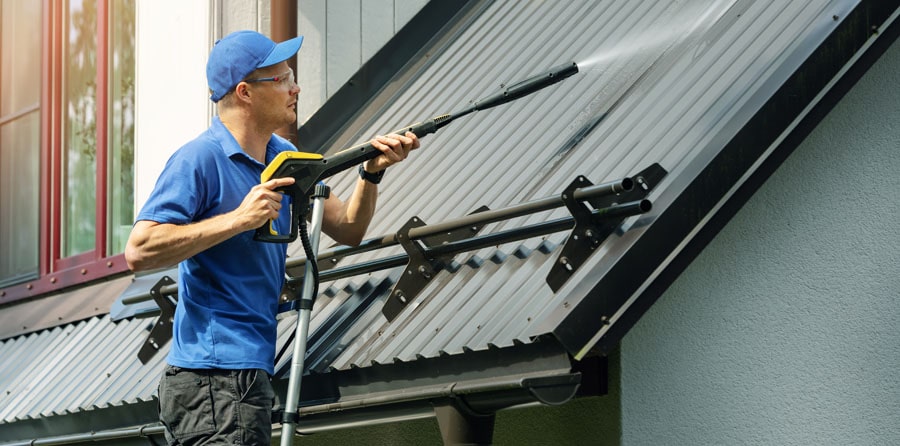
Pressure washers are a godsend for exterior cleaning, but you have to respect them. To stay safe, be sure to check out our beginner’s guide to using pressure washers safely.
Here are some basic safety tips for electric pressure washers:
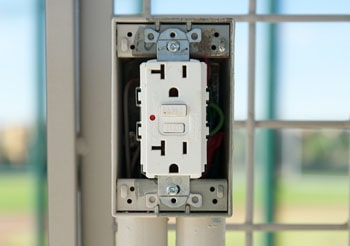
- Read and follow the manual!
- Wear protective clothing – long pants, goggles, work boots or other sturdy closed-toed footwear
- Start spraying surfaces about 2 feet away and gradually move closer, no closer than 6 inches
- Stay off ladders!
- Never EVER point the nozzle at any part of you, other people, pets, or plants
- Do NOT use extension cords for electric pressure washers
- Always plug into a GFCI outlet
Nozzles and other attachments
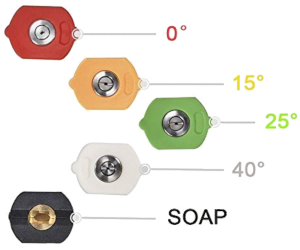
Most pressure washers come with interchangeable nozzles that allow varying widths of water streams.
The typical types are:
- red (0 degree)
- yellow (15 degree)
- green (25 degree)
- white (40 degree)
- black (soap)
There are other attachments and accessories you may find helpful for your pressure washer. Some of these you have to buy from the washer’s manufacturer, while some are universal. Here are a few:
Troubleshooting Tips & Tricks

During our research, we came across customer and manufacturer suggestions for fixing various issues that may arise with a pressure washer. With electric models, the most common complaints involve the motor not starting and pressure loss. If you’re not confident with your fix-it skills, take your machine to a local repairman or call the manufacturer to see about a replacement. But for those fix-it folks among you, try these tricks.
For motors that no longer start:
- Check the reset button on the plug. It’s possible to trip it while plugging it into the power outlet outside.
- Try a pump protector lubricant after each use, like this one from Briggs & Stratton. Leftover water in the unit can seize up the pump’s internal gaskets. You screw the plastic threads on the lubricant bottle into the threaded garden hose inlet on the pressure washer and squeeze the trigger on the bottle. It’s especially good for use before extended storage (winter, for instance) and before first startup the next season.
- There could be an electrical issue within the GFCI plug of the power washer itself, especially if it’s left out in the rain or where there’s lots of humidity. With the unit unplugged, use a screwdriver to take the cover off of the cleaner’s GFCI plug. If you see lots of moisture trapped in the plug, that can prevent it from running. You can buy a replacement plug at the hardware store or one like this Leviton brand online. Just reconnect the wires to the new GFCI plug (black wire to gold connector, white to silver) and turn the screws to secure the wires. Screw down the “U” shaped stress clamps that come with the new plug. Then attach the new cover, and try starting up the machine.

For pressure loss:
- The nozzle may have a blockage. Turn the pressure washer off, and bleed air out of the system. Remove the nozzle. Hold the nozzle by the sides with the front of the nozzle facing you. Using the spray tip cleaning tool or a straightened paper clip, try pushing the clog back the way it came. Rinse the nozzle thoroughly front and back. Replace the nozzle and try washing with it again. If the nozzle remains clogged, remove it and repeat the process. If still clogged, try soaking the nozzle in hot water and then try washing again.

- Try a different nozzle – you might not be using the right one.
- Look to see if the hoses are kinked and straighten them out.
- Check the inlet and un-loader valves. If clogged, clean them or replace with new valves.
- For pulsating pressure, turn off the machine and try bleeding air from the hose by squeezing the trigger.
Final Thoughts
Well, that just about covers everything you need to know about the very best electric pressure washers of 2023. I hope that this information has been helpful for you and will better guide not only your final purchasing decision but in owning and maintaining your very own electric power washer.
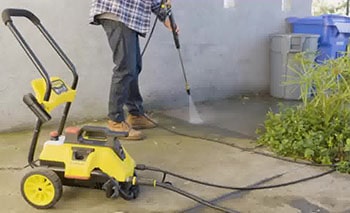
We understand the complexity and confusion that comes with making a major purchase for your home, which is precisely why the Cleanup Expert is here to help you through every step of the buying process, from researching models all the way to maintaining them.
Our comprehensive guides and helpful advice have been carefully crafted to assist you throughout your ownership of your new electric pressure washer. Now you’re prepared with all the information you need, so that you can better focus on tackling the dirt, stains, and grime around your property!

Pressure Washer Tips & Tricks
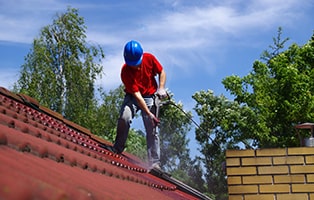
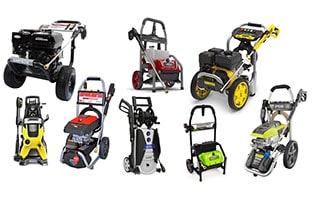
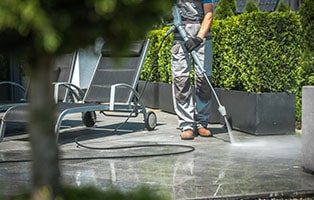
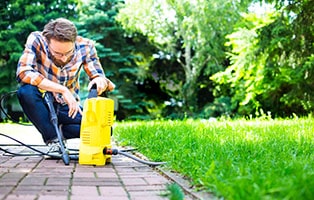
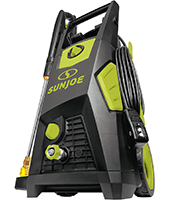

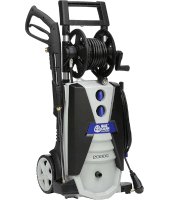
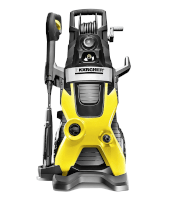
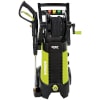





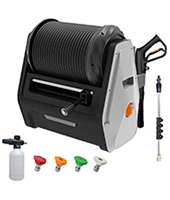
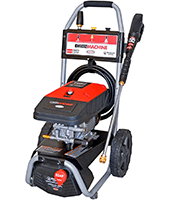
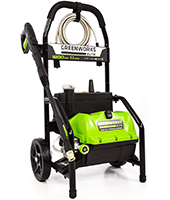


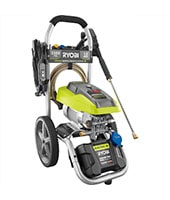
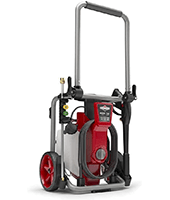

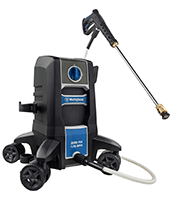
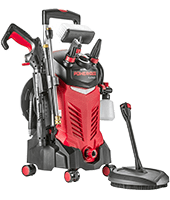
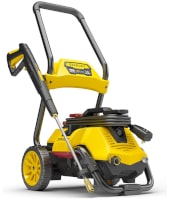






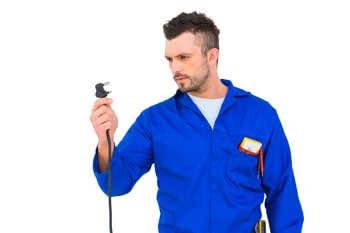
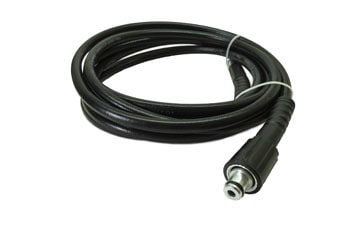
I see a bunch of electric power washers that advertise a PSI over 3000, some even as high as 4500. Are those accurate? If so, it would seem then that you can find electric power washers just as powerful as gas powered. However, I am skeptical of the advertised PSI.
Why should I choose an electric-powered pressure washer over a gas-powered pressure washer?
Electric-powered pressure washers are not only convenient, they are also a safer option for homeowners that may not have experience with gas-powered appliances. They also pack a serious cleaning punch but are safer to use on the more sensitive surfaces in your home. With built-in wired connections, your power source is found right inside. It is still essential to be mindful of safety when using these appliances—any pressure washer can cause injury if directed at people or animals.
I have a heavy mildew/mold buildup on my concrete patio. I also have several decks that need to be cleaned before repainting. Which electric pressure washer would handle this? Thanks.
What is a good electric powerwasher .that is over 3000 psi to buy
You will have to go to 230 volt for that power level. Northern Tool sells one that meets your requirements.
I’m looking at the Bauer 2000psi electric unit. It has a 4.8 star rating. Any comments?
Bauer 2300 is a better option
My parents are retired and not in the best of health. But they want a pressure washer to keep their walk and deck clean. What is better for them- the Sun Joe SPX3001 or AR Blue Clean AR390SS?
For older people or those with mobility issues, the AR Blue Clean probably has the advantage over the Sun Joe. It’s pretty lightweight at only 31 pounds and breaks down for compact storage when not needed.
It’s good for most light-moderate duty jobs around the home, which should meet their needs just fine unless there’s a heavy grime buildup. It comes with a rotary/turbo nozzle for the tougher dirt which won’t require as much time and physical effort. Due to its height, it can be a little top-heavy and prone to tip over if not kept level. But the total stop system automatically shuts off the spray when the trigger is released, which is a good safety measure in case the wand is dropped.
I only have 2 outdoor outlets. They are on the front and back of the house. What are your suggestions since you aren’t supposed to use extension cords? How do I reach the sides of the house? My house is a long ranch style.
Hello Cathy, sorry to hear you’re having such a hard time! While you generally should avoid using an extension cord whenever possible, it is okay to use them, provided you do it the right way. As long as your pressure washer is UL approved, you can safely use extension cords under 60ft long that are at least fourteen gauge. I hope that helps solve your dilemma!
What do you think of the Sun Joe spx3501? Choosing between this and spx3001. Thanks for the help.
The SPX 3501 is a step up from the 3001 in price and additional power. The 3501 produces up to 2300 PSI at 1.48 GPM while the 3001 produces 2030 PSI at 1.76 GPM.
You do have a sturdier body style on the 3501 – wider on the bottom than the top, which may prevent the problems the 3001 has had with flipping over during use. The 3501 may be a little quieter at higher speeds with its brushless induction motor.
Other than that, they have the same specs in terms of cord and hose length and detergent capacity. So it’s kind of a toss up. If you want a little extra power, a steadier foundation, and don’t mind paying around $50 more, go with the 3501.
I have a lot of second story cleaning (windows/siding) to do, but I’m afraid my little light-duty Greenworks washer won’t cut it. What PSI do I need my pressure washer to have?
Any kind of second-story work will take at least a mid – heavy duty pressure washer up to around 3000 PSI. The reason being, you’ll likely need a hose or wand extension, and adding extra length means lowering the pressure.
Since the Greenworks rings in at about 1600, you’ll definitely want more oomph. If you prefer an electric power washer, we’d recommend the AR Blue Clean AR390SS or the Karcher K5 Premium or Karcher K2000.
I have access to both hot and cold water in my garage. For killing mildew and bacteria, I’d prefer to pressure wash with hot water, but can I use hot water in my pressure washer or not?
That depends on the pressure washer. There are pressure washers specifically designed for use with hot water or those that heat the water for you post-pump. For most models, though, the answer is no.
Hot water can damage pressure washers for a couple reasons. One, the seals around the pump and tubing could be damaged with water that’s over 100 degrees F. Also, your water pump depends on the water flow to help keep it cool. You risk overheating it if you run hot water through it.